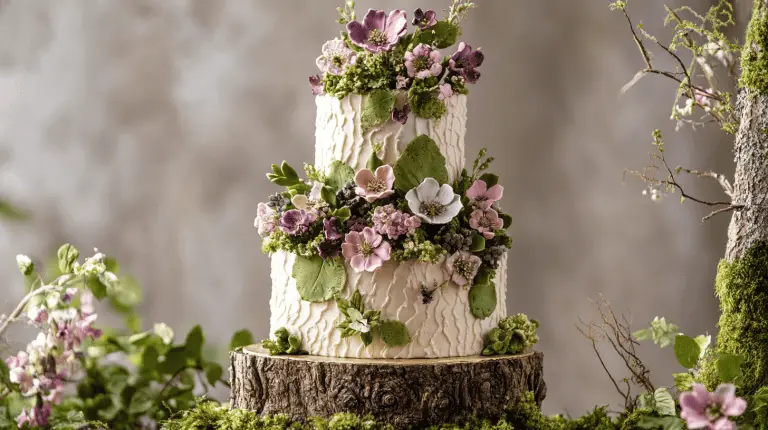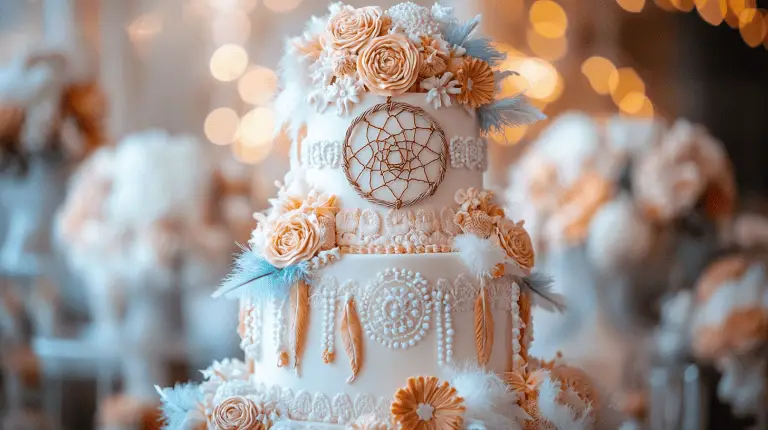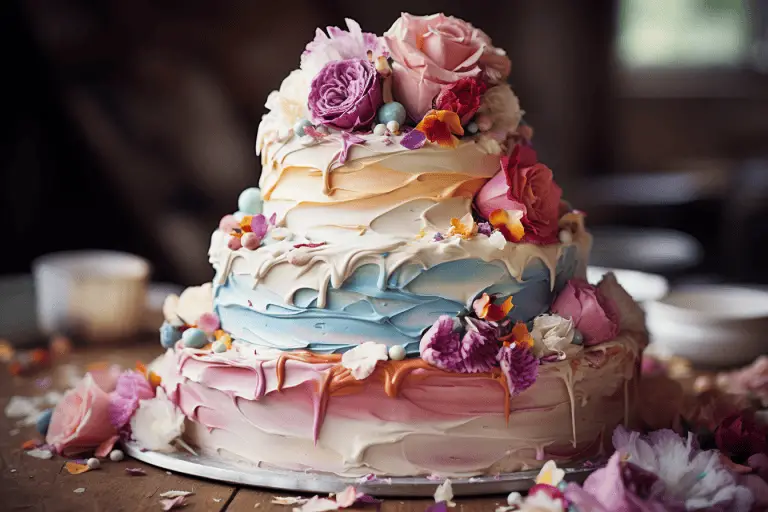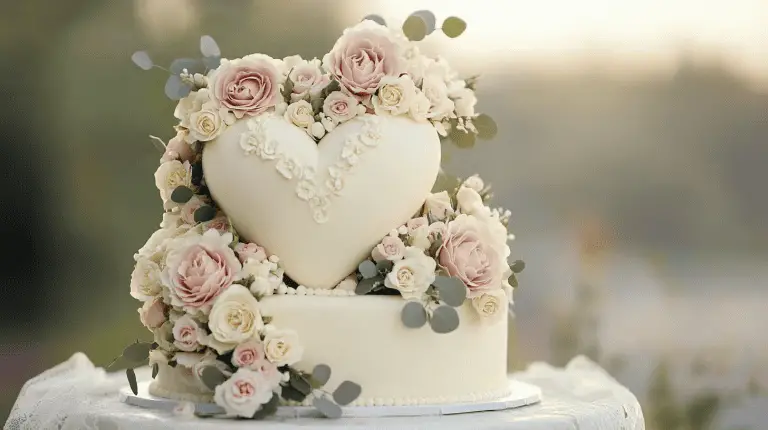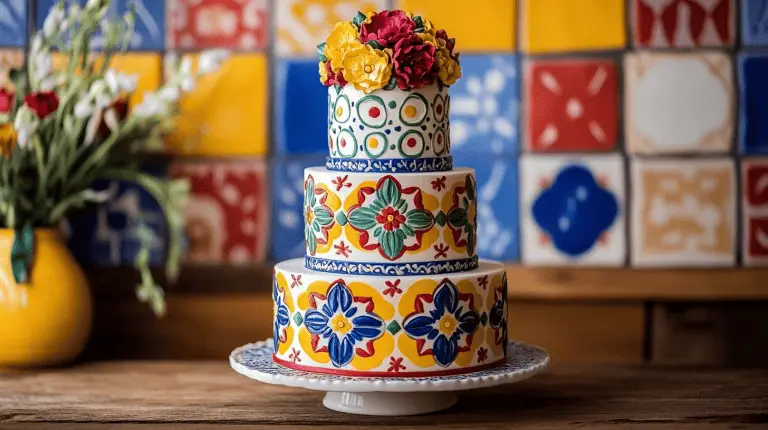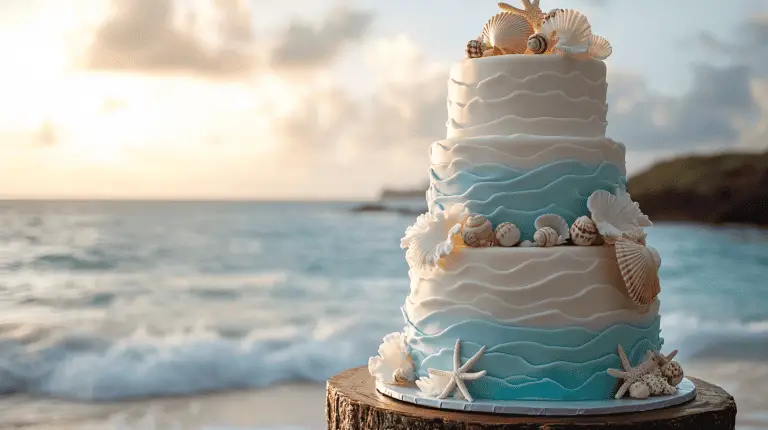How Much Do Wedding Cakes Cost: An Insider’s Pricing Guide
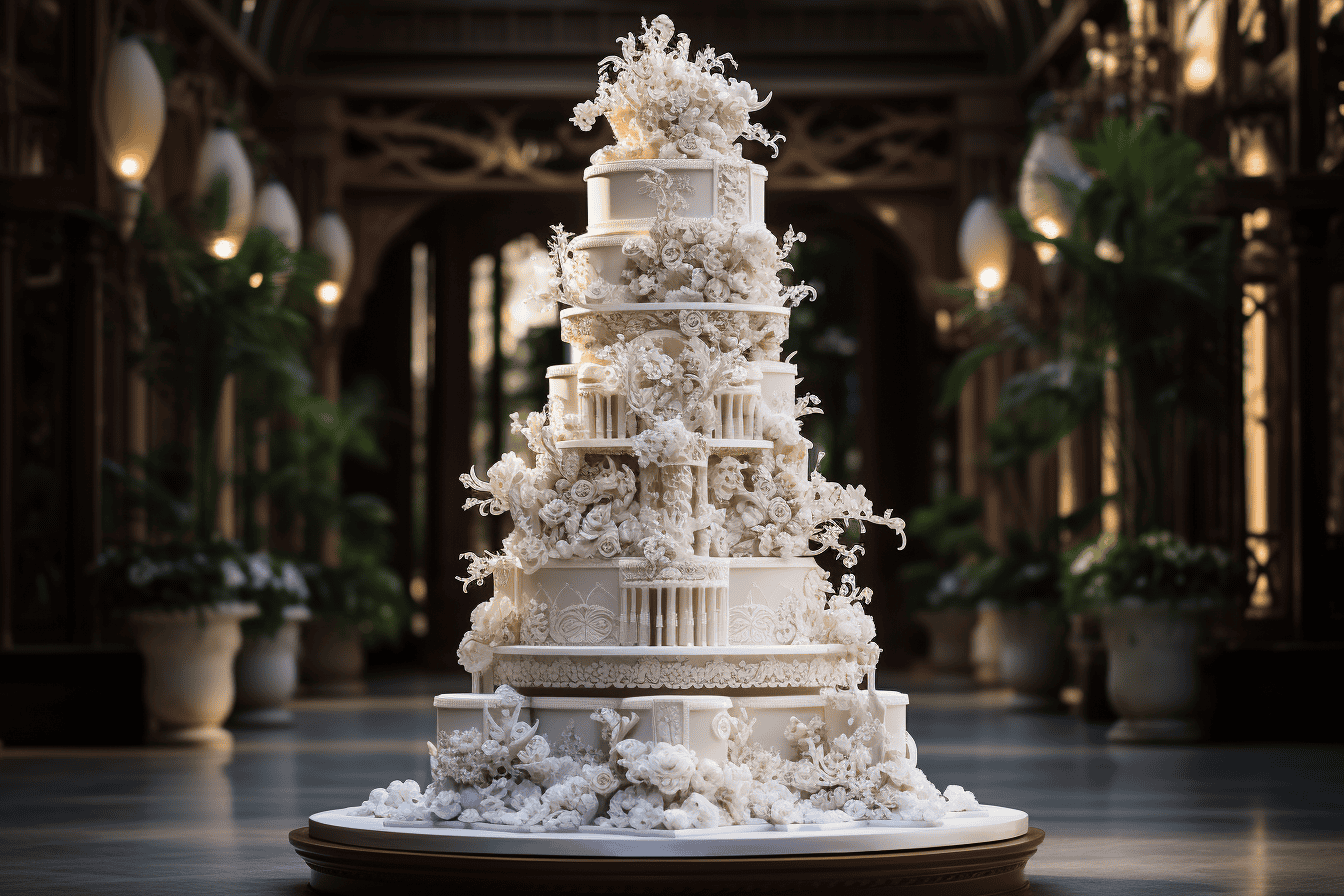
When planning a wedding, one key element that often garners significant attention is the wedding cake. A symbol of celebration and a centrepiece of the reception, it’s not just a dessert but a part of the matrimonial tradition. The cost of a wedding cake can vary greatly and is typically influenced by multiple factors including size, design, ingredients, and the reputation of the baker.

On average, couples in the U.S. might expect to spend around $500 on their wedding cake. However, prices can range significantly from this average, influenced by the level of customisation and the number of servings required. A basic cake might start at a lower price point, while an elaborate creation with intricate designs or high-quality ingredients can increase the cost considerably.
Understanding these variables is crucial to setting a realistic budget for wedding cakes. The prices can fluctuate depending on whether the cake is adorned with handmade sugar flowers, covered in fondant, or tiered to serve a large number of guests. The chosen bakery’s location and prestige may also affect the overall price. Consequently, thorough research and early planning are essential in securing the ideal cake that fits both the vision and budget of one’s wedding.
Understanding Wedding Cake Costs
When planning a wedding, the cake is both a centrepiece and a significant part of the budget. The cost of a wedding cake can vary greatly based on several factors, but understanding the average costs and the elements affecting the price can help couples plan effectively within their budget.
Average Wedding Cake Cost
In the United States, the average cost of a wedding cake hovers around $500. However, this figure can fluctuate significantly. For example, minimum prices typically start at about $125, while more elaborate cakes can exceed $800. On a per-person basis, the price can range from $2 to $12 per slice.
5 Factors Influencing Cost of wedding cake
Several key factors influence the final cost of a wedding cake:
- Size and Scale: Larger cakes that serve more guests naturally require more materials, which increases the cost.
- Ingredients: High-quality or specialty ingredients contribute to a higher price.
- Design Complexity: Elaborate designs with intricate decorations or custom shapes require more time and skill from the baker.
- Frosting Type: Some frosting options, like fondant, are more expensive than buttercream.
- Additional Decorations: Details such as sugar flowers, modelling chocolate work, or edible gold leaf can add to the cost.
It is crucial for couples to align their wedding cake choices with their wedding budget to avoid overspending. The national average provides a guideline, but the ultimate cost will depend on the couple’s specific selections and local pricing variations.
The Role of Size and Servings for Wedding cakes
The amount of cake needed for a wedding is closely tied to the guest count and how the cake is divided, which affects both the size and the number of tiers required.
Determining the Appropriate Cake Size
When planning a wedding cake, the size is directly influenced by the number of servings needed. Standard servings are typically 1-inch by 2-inch slices. The size of the cake itself, and consequently the number of tiers, should correspond to the anticipated number of guests to ensure everyone receives a slice.
- For 100 guests, a three-tier cake may suffice.
- For 150 guests, one might consider a four-tier cake.
- For 200 guests, a cake with five tiers might be appropriate.
Guest Count and Number of Tiers
The relationship between the guest count and the number of tiers is crucial for a well-proportioned wedding cake:
- Number of guests: Every tier can be expected to serve a set number of guests.
- Tier sizes: They often range from a 6-inch diameter top tier to a 14-inch or larger base.
Here is an approximate breakdown:
| Guests | Number of Tiers | Suggested Tier Sizes |
|---|---|---|
| 100 | 3 | 6″, 8″, 10″ |
| 150 | 4 | 6″, 8″, 10″, 12″ |
| 200 | 5 | 6″, 8″, 10″, 12″, 14″ |
Adjustments can be made for half-servings or larger party-size slices, necessitating changes in the overall cake size and tiers.
Cake Design and Customisation

The cost of a wedding cake can significantly vary based on the intricacies of design and level of customisation. A couple should consider the aesthetic aspect of the cake and how it complements the overall theme of the wedding.
Choosing a Style and Design
An initial consultation with a professional cake designer is often the first step in the selection process. Here, couples can express their vision, which may range from a simple design to more elaborate handmade sugar flowers. The style and design of a wedding cake are essential, as they reflect the couple’s tastes and the wedding’s tone. Whether opting for a multi-tiered traditional cake or a contemporary naked wedding cake, the choice dictates the complexity and, consequently, the price.
Additional Decorations and Embellishments
Decorations and embellishments also play a crucial role in the final appearance and cost, such as edible gold leaf, intricate lace patterns, or cascading fondant pearls. A cake’s shape can transition from traditional round tiers to more adventurous geometric designs, each demanding various levels of craftsmanship. When considering add-ons, couples should remember that these intricate details, especially if they are handcrafted, will add to the overall cost.
- Simple designs without added decorations are typically more affordable.
- Custom colours and designs may incur additional charges.
- Handmade sugar flowers and other intricate decorations are priced based on complexity and the time required to create them.
Ingredients and Flavours
When considering the cost of a wedding cake, the selection of ingredients and flavours plays a significant role in determining the final price. Premium ingredients and customised flavours often require a higher expenditure.
Selecting Cake Flavours and Fillings
Couples can choose from a plethora of cake flavours, ranging from the classic vanilla and chocolate to more exquisite ones like red velvet and salted caramel. The fillings can be as simple as a smear of buttercream or as luxurious as layers of fresh fruit compote or rich chocolate ganache. Artisanal fillings, especially those made with organic or high-end ingredients, can affect the price due to their quality and the complexity of their preparation.
A popular choice among wedding cakes is buttercream icing, known for its smooth texture and versatility. It can be infused with various flavours, and its colour can be customised to match the wedding theme. Another common and elegant option is fondant, a rollable icing that provides a sleek and smooth finish, enabling a myriad of decorative options. While it offers a refined appearance, it tends to be more costly than buttercream due to the labour and skill required to work with it.
Alternative Dietary Options
With the rise in dietary restrictions and preferences, bakers now offer a variety of vegan and gluten-free options. They include alternatives like gluten-free flour blends and plant-based substitutes for dairy products. These alternatives ensure that everyone at the celebration can enjoy the cake without compromising on taste or dietary needs. However, these specialty ingredients can increase the cost of the wedding cake, as they are often more expensive than their traditional counterparts. Vegan frosting options, such as those made from non-dairy butter and creams, are also available and are designed to mimic the taste and texture of traditional buttercream.
Baking and Labour Considerations

When considering the cost of a wedding cake, it’s imperative to account for the intricacies of baking and labour. These factors significantly influence the final price, encompassing everything from the baker’s time to the complexity of the design.
Labour and Time Investment
The production of a wedding cake is a time-intensive process, requiring meticulous attention to detail. A baker or cake designer dedicates hours to planning, baking, and decorating. Labour costs, therefore, represent a substantial component of the overall expense. A single cake can demand anything from a few hours for a simple design to several days or even weeks for elaborate multi-tiered creations. Clients should expect these time commitments to be reflected in the baker’s pricing.
- Consultation and Design: Initial discussions to understand the couple’s vision.
- Baking: Crafting the cake itself, which can range from standard flavours to unique combinations.
- Decoration: Intricate designs require a higher investment of time, skill, and materials.
Choosing a Professional Baker or Bakery
Selecting a professional baker or bakery is crucial as they bring experience and expertise that ensure the wedding cake is both beautiful and delicious. A professional can provide a wide array of options, including but not limited to, specialty cakes, cake pops, cookies, and cupcakes. During a cake tasting, couples can sample different flavours and textures before making a decision.
Key considerations include:
- Portfolio: Reviewing past work to assess style and quality.
- Specialisation: Some bakers may specialise in certain types of cakes or decoration techniques.
- Materials: The quality of ingredients contributes to the taste and can affect the price.
- Availability: Bookings should be made well in advance, especially with sought-after cake designers.
Clients are advised to have an open dialogue with their potential wedding cake baker to ensure their needs are met within the agreed budget and time constraints.
Logistics and Additional Costs

When budgeting for a wedding cake, it’s important for couples to consider not just the cake itself but also the logistics and additional costs associated with its delivery and setup, as well as the cake tastings and consultations.
Delivery Fees and Set Up Costs
Delivery fees vary depending on the distance the bakery needs to travel to the wedding venue. Delivery fees may be fixed or calculated based on mileage. A nearby delivery might cost around £50, whereas further distances could increase costs significantly. Some bakeries offer free delivery within a certain radius, so it is advisable to confirm this when placing the order.
For the setup of the cake, which includes properly positioning it on the cake stand and adding any final touches such as a cake topper, there could be an additional charge. This is often included in the overall price but can be listed as a separate fee by some providers. The exact fee can be impacted by the complexity of the cake design and the time required to set it up. Moreover, if specialty utensils for cutting or serving the cake are requested, these may incur extra charges.
Cake Tastings and Consultations
Cake tastings and consultations are typically held before finalising the cake order to ensure the couple’s satisfaction with the flavour and design. Some bakeries offer this service complimentary, but others may charge a fee that can range from £25 to £100. This fee sometimes can be deducted from the final cake price if the couple decides to book with the bakery. During the consultation, discussions about cake pricing and design options occur, and factors such as the number of tiers and whether there will be additional sheet cakes for serving are considered in the final wedding cake pricing.
Finalising Your Wedding Cake Order

When it comes to finalising the order for a wedding cake, understanding the payment structure and timetable is crucial to ensure the cake aligns with the couple’s budget and is ready for the big day.
Deposit and Payment Plans
Upon making a decision on a wedding cake, the couple usually pays a deposit to secure their baker’s services. This deposit typically represents a percentage of the overall cake price and is often non-refundable. Wedding cake prices can vary greatly, but couples should expect to put down around 20-50% of the cake cost upfront. Bakers may offer payment plans to allow the remaining balance to be paid off over time, leading up to the wedding.
- Deposit Example: For a cake priced at £500, a 50% deposit would be £250.
Planning Ahead and Order Timeline
Planning ahead is essential; couples should aim to finalise their wedding cake order several months before the event. Most bakers require final orders to be placed at least 3-6 months in advance. Timelines can be even longer in peak wedding season or if the chosen baker is in high demand. A clear order timeline helps manage the wedding budget effectively and avoids last-minute rushes or potential disappointments.
- Order Timeline Example:
- 6 months before wedding: Secure baker with deposit.
- 3 months before wedding: Finalise cake design and flavours.
- 1 month before wedding: Pay the full balance of the cake price.
Saving on Wedding Cake Costs
When planning a wedding, couples can save money on their cake without sacrificing quality. Smart choices in design and cost-saving strategies are key.
Simple Yet Elegant Design Choices
One can reduce the wedding cake cost by opting for simple yet elegant designs. A minimalist approach that focuses on a smooth finish and a few high-quality decorations can offer significant savings compared to an intricate cake with multiple tiers. For instance:
- Use fresh flowers instead of sugar flowers. They can be less expensive and equally beautiful.
- Consider a simple design with fewer customised details like edible gold leaf or extensive piping.
Strategies to Cut Down Expenses
They can employ several strategies to cut down wedding cake expenses effectively:
- Choose a smaller display cake for the ceremonial cut and supplement it with a larger sheet cake served to guests.
- Avoid peak season upcharges by discussing with the baker any off-season discounts.
- Purchasing an anniversary cake separately rather than saving the top tier may reduce the initial size and cost of the wedding cake.
By carefully considering design elements and exploring various cost-reduction strategies, couples can enjoy a beautiful and delicious cake while adhering to their budget.

